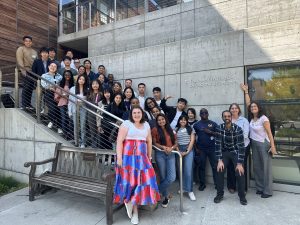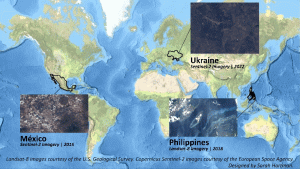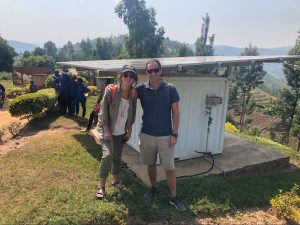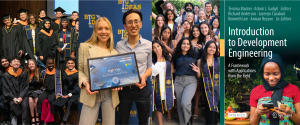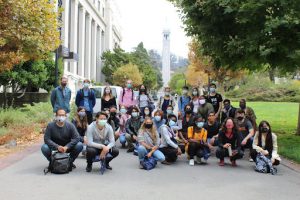
By Sam Goldman
Barbara Mensah had studied education, founded her own organization to empower rural girls, and worked at a university in Ghana. But wanting to take the next step in her education and career, she had applied and been accepted to UC Berkeley’s first cohort of the brand-new Master of Development Engineering (M.DevEng) program, housed at the Blum Center. It would be a 7,700-mile trip.
The program had nominated Mensah for a Mastercard Foundation scholarship. When she accepted it, she and other UC Berkeley recipients of the scholarship received an informational email with each other’s names and emails visible. One name stood out. “Is this the Patricia Quaye I know?” she asked herself.
Mensah sent Quaye a WhatsApp message, asking if she was the Patricia Quaye she knew from university in Ghana — the one who had received the same scholarship as Mensah in undergrad. She was. Both, it turned out, chose the Sustainable Design Innovations track of the five M.DevEng tracks available, and both, like many of their peers from abroad, are part of UC Berkeley’s I-House community. Both had even been working in education in Ghana, and now, on another continent, they’re neighbors.
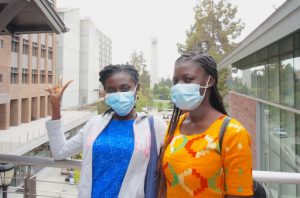
Mensah, Quaye, and 44 other students from around the U.S. and the world — coming from the fields of finance, electrical engineering, nursing, and beyond — make up the inaugural cohort of the three-semester professional master’s program in development engineering, a transdisciplinary field founded at UC Berkeley that creates technology interventions in accordance with and for individuals living in low-resource settings.
As the Berkeley campus transitions to a mostly in-person fall semester, most students were able to attend a masked-up, open-windows welcome orientation on August 23. “It’s been a long journey for you to get here,” said Shankar Sastry, Blum Center faculty director, professor of computer science, and leader of the M.DevEng AI/Data Analytics track. “It’s particularly exciting to be here in person after an extraordinarily challenging year.”
“The idea of development engineering is to combine the social sciences with the hard sciences, technology and engineering, and policy,” said Alice Agogino, Blum’s education director, professor of mechanical engineering and leader of the Sustainable Design Innovations track. “We want to tackle problems that require system-level solutions — systems solutions that require multiple disciplines.”
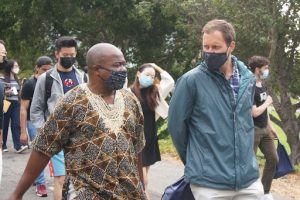
The new cohort is diverse not only in geographic origin, but also in training and age. Shubham Salunkhe arrived straight out of undergrad at the University of Illinois, Chicago. After interning at UIC’s Energy Resources Center, he decided he needed to gain more knowledge before diving into industry. Malawi native Mathews Tisatayane spent the past decade working as a nurse in San Francisco, while masterminding community-oriented avenues for building wealth and stability on a local level in Malawi.
Tisatayane had devised solar-powered egg-incubators and brooders to support a chicken-raising operation in his hometown. If his community raised their own birds, they would eat well, which meant better health, self-reliance, and opportunity. Faulty machinery derailed the project, but motivated him to learn more. He discovered Berkeley’s Renewable and Appropriate Energy Lab (RAEL), run by Professor Daniel Kammen, a Blum Center faculty member. His search led him to the new M.DevEng program, which he decided could provide the skills and networking bridge he needed to make a lasting impact in Malawi and, eventually, beyond.
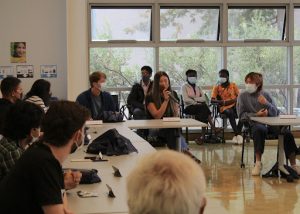
“I’m a little bit emotional, a little bit in disbelief,” Tisatayane said of starting graduate school at age 48. His younger peers, he said, were “working forward” on building their skills, “while I’m working backward” on filling them in.
Despite the momentousness of arriving at the top university in the U.S., however, the most common surprise among students didn’t have to do with rigorous academics, eye-popping Bay Area rents, or “Berserkeley” culture.
“California is so hot,” Quaye recalled hearing as she prepared to move from the hot climes of Ghana. “But it’s cold!” she added, sitting outside Blum Hall after orientation.
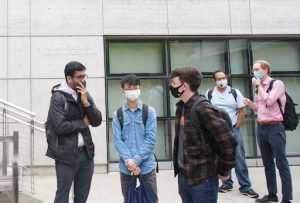
Raghav Mittal, who arrived two days prior from the outskirts of Delhi, India — another legitimately hot area — had the same expectations: the sunny California of the media and postcards.
Nope.
“That’s why I’m always wearing a jacket,” he said on a campus tour following orientation.
But it will be in this fickle climate that Mittal, Quaye, and their peers will begin building projects that will make a tangible impact on the well being of those in low-resource areas.
“Consider yourselves the leaders of this field,” M.DevEng program coordinator Yael Perez told the inaugural group at their orientation’s opening remarks — “a field in the making.”

